Medical Ego Inflation and a Lesson from Mom

By Warren R. Heymann, MD
Oct. 31, 2016
 Last week my 95-year-old mother literally returned from the deceased. In classic Hollywood motif, my cousin Elysa, who was at her bedside when she was moribund, was pleading for me to desperately get to there, demanding that the attending do something, as he was asking her about her DNR status. “Can’t you at least give her oxygen?” Elysa asked. He complied, while I was frantically trying to find a parking spot. Finally jumping out of the car, running through the hospital in lunatic mode, I made it to the bedside, where I thought this was the end. My mother had yet another syncopal episode the day before (her repeated very thorough work-ups had been non-revealing); she bruised herself falling in the bathroom and could not get up. When I left the hospital room late the night before, she seemed stable.
Last week my 95-year-old mother literally returned from the deceased. In classic Hollywood motif, my cousin Elysa, who was at her bedside when she was moribund, was pleading for me to desperately get to there, demanding that the attending do something, as he was asking her about her DNR status. “Can’t you at least give her oxygen?” Elysa asked. He complied, while I was frantically trying to find a parking spot. Finally jumping out of the car, running through the hospital in lunatic mode, I made it to the bedside, where I thought this was the end. My mother had yet another syncopal episode the day before (her repeated very thorough work-ups had been non-revealing); she bruised herself falling in the bathroom and could not get up. When I left the hospital room late the night before, she seemed stable.
“What’s going on?” I asked hurriedly.
“We think she has pneumonia, so we put her on antibiotics. We don’t think she has a PE [pulmonary embolus], but we anticoagulated her. There’s really not much else we can do.”
“Excuse me, but 24 hours ago she was ranting about Hillary and commenting on the latest issue of Scientific American. We don’t want to sustain her life artificially. If you told me she had a massive stroke or MI, that’s one thing, but pneumonia??? She’s not DNR — please pull out the stops — perhaps this is reversible — she deserves that chance”, I declared assertively.
Off to the ICU, with a pH of 7.04, a lactic acid of 8, intubated, and sedated. A gathering of her loved ones congregated, with an overarching disbelief that this is the passing of the matriarch. I went home, exhausted and somewhat guilt-ridden that my decision prolonged the inevitable, and at what cost? The following morning, she woke up, able to write questions, including “What happened?” She alertly absorbed what transpired. When I asked her if I made the right decision, my mind eased when she wrote “yes.” Within 48 hours, she amazed all, by being extubated, her shock numbers normalized, smiling, conversing in her usual manner and out of the ICU. My resilient mom escaped her demise again.
Her pulmonologist and cardiologist think they may have an explanation — possibly worsening aortic stenosis with small volume left ventricular outflow obstruction.
“If she were 52, we’d do a procedure”, the pulmonologist stated, “but for now we’ll monitor it”.
“Monitor it for what? To only happen again? Let me ask my mother, but I already know what the answer will be”, I responded.
“Tell him to treat me like I’m 52. My body may be 95, but my mind is 52” mom opined. I would have been stunned by any other response.
I thought everything was going in the right direction, until yesterday, when her attending advised me to stay close, because her pulmonary status worsened. I asked him outright if I should cancel my visiting professorship to Bob Brodell’s Department of Dermatology at the University of Mississippi, and his answer was an unequivocal yes (I cannot thank Bob enough for his gracious support and understanding this week, as I have been dealing with this. His ability as a dermatologist is exceeded only by his warmth and understanding).
As I sit here with mom, holding her hand, there is not much else I can do other than go through emails, and delete, delete, delete. I cannot believe how many requests I get for yet another “Top Doctor” plaque and requests to write an article for another open access online journal (with a hefty publication fee and deadline!), or join their editorial board.
Don’t get me wrong — I am truly honored and humbled by legitimate accolades; however, I do not wish to be taken advantage of by the process.
Awards count. Even Bob Dylan finally acknowledged the importance of his Nobel Prize for literature. The Academy Awards, the Presidential Medal of Freedom, and a World Series ring (Cleveland or Chicago) all bestow singular and esteemed achievements.
Publications matter. Despite the challenges, peer reviewed papers in prestigious journals such as the New England Journal of Medicine, JAMA Dermatology, and the JAAD are essential for advancing knowledge and academic promotion.
The proliferation of awards and online access journals has diminished the meaning of excellence. I am not being cynical in stating that each has become big business by taking advantage of a professional’s ego. The ethics of “Top Doctor” awards has been thoughtfully discussed (1) and the undermining of academic integrity of “predatory” journals has been justifiably detailed (2).
One of the greatest lessons my mother taught me is to look in the mirror and “always do your very best — if any less than that, you’re only fooling yourself. There will always be someone richer, but many poorer; someone brighter, but many less so; and someone more generous, but many less caring. Be grateful and keep your ego in check.”
She also encouraged me go into medicine rather than journalism — “be a doctor first, you can always write.”
Mom, I may be approaching Medicare age, but I pray you pull through. I still need your love and advice.
Kirsch B, et al. The Ethics of “Top Doctor” awards: A tangled web. J Am Acad Dermatol 2013; 69: 792-4.
Eriksson S, Helgesson G. The false academy: Predatory publishing in science and bioethics. Med Health Care Philos 2016 October 7 [Epub ahead of print]
All content found on Dermatology World Insights and Inquiries, including: text, images, video, audio, or other formats, were created for informational purposes only. The content represents the opinions of the authors and should not be interpreted as the official AAD position on any topic addressed. It is not intended to be a substitute for professional medical advice, diagnosis, or treatment.
DW Insights and Inquiries archive
Explore hundreds of Dermatology World Insights and Inquiries articles by clinical area, specific condition, or medical journal source.
All content solely developed by the American Academy of Dermatology
The American Academy of Dermatology gratefully acknowledges the support from Incyte Dermatology.
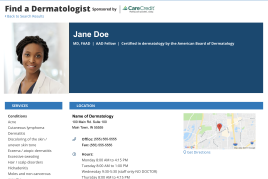 Make it easy for patients to find you.
Make it easy for patients to find you.
 Meet the new AAD
Meet the new AAD
 2022 AAD VMX
2022 AAD VMX
 AAD Learning Center
AAD Learning Center
 Need coding help?
Need coding help?
 Reduce burdens
Reduce burdens
 Clinical guidelines
Clinical guidelines
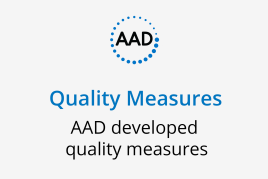 Why use AAD measures?
Why use AAD measures?
 Latest news
Latest news
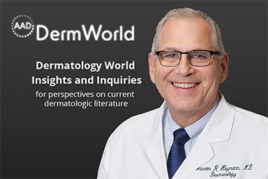 New insights
New insights
 Combat burnout
Combat burnout
 Joining or selling a practice?
Joining or selling a practice?
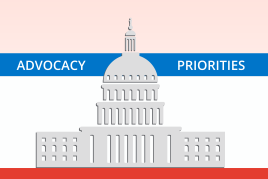 Advocacy priorities
Advocacy priorities
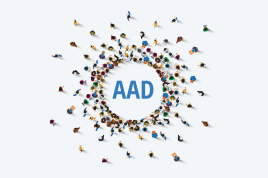 Promote the specialty
Promote the specialty

